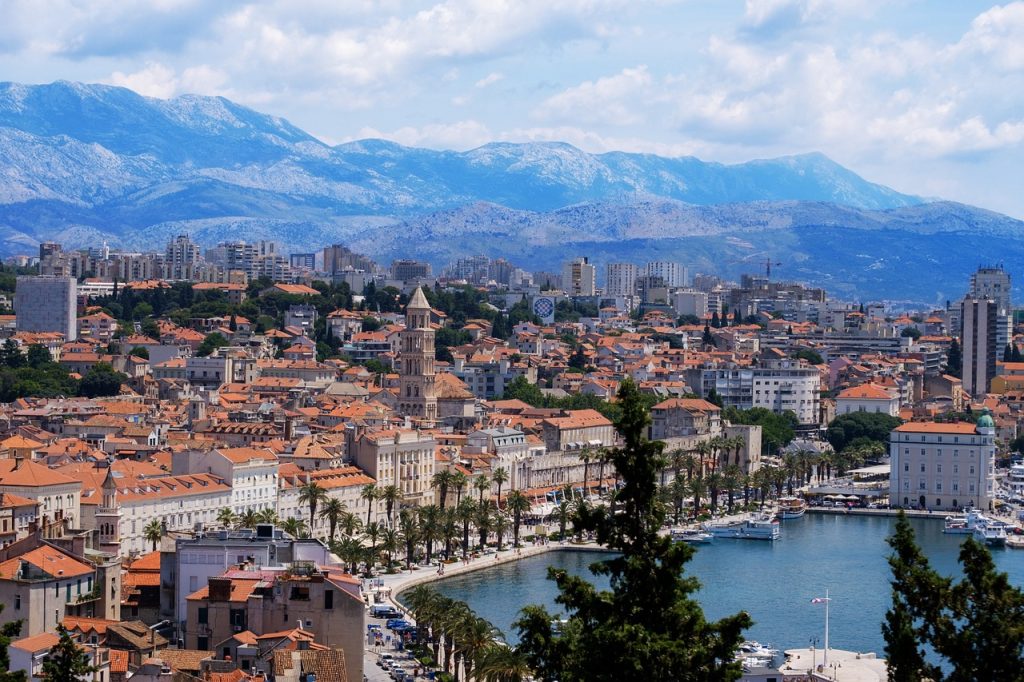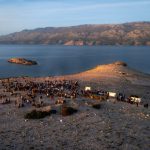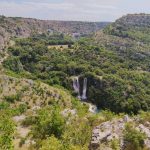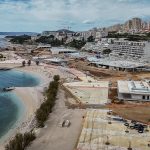April 18, 2024 – As the 2024 tourist season starts, differing views on how to tackle the issue of drunken tourist excess in the Dalmatian capital of Split.
It has already started, and we are in the middle of April.
The first videos of public urination in the UNESCO World Heritage Site of Diocletian’s Palace by topless and drunken tourists in the historic residential zone. It promises to be a long season of sleepless nights for those locals still living in the palace, unless something can be done.
The ‘development’ of the historic zone as a tourist zone has been fast, chaotic and with zero strategy. Those who blame the current administration for all the problems would do well to look in the mirror at the failings of putting in a proper strategy to manage the destination date back more than a decade. Quite how we have got to a situation where a Roman Emperor’s retirement home and World Heritage Site specialises in nightclubs and pub crawls promising ‘the best night of your life that you will never remember’ is a spectacular failure of planning dating back years.

It wasn’t always so. When I moved to Dalmatia in 2003, Split was known simply as the Gateway to the Islands, and Diocletian’s Palace was a rather forbidding place, frequented by drug users, and a little intimidating at night (in as much as Croatia could ever be intimidating). The first hostel only opened in 2006, but in the last decade, Split has become a massive tourism hit, one of the must-visit spots on the Adriatic.
It is not hard to understand why. In addition to the historic centre, Marjan hill (the lungs of the city), beaches, islands, the Mediterranean lifestyle, the adventure tourism of inland Dalmatia, fantastic food and wine, and so much more, Split has the potential to be one of the top destinations in Europe.
But lack of strategy and vision has left it in danger of going down the wrong path. A lot of people lay the blame fairly and squarely at the feet of the Ultra Europe Music Festival, which launched its first festival in the Dalmatian capital back in 2013. It was a huge hit and portrayed Split as a cool and happening city on the Adriatic. And had the city had a strategy to manage that, things would have moved in a totally different direction.
Ten years later, Ultra Europe is still going strong, and it is interesting to compare Split the tourist destination and the Ultra Europe Music Festival itself. The festival attracts up to 150,000 people annually over 3 days, from as many as 143 countries. The private organisation is outstanding, and over the last decade, there have been very limitied incidents, disproportionately few for an event that size in peak season.
As Split was hitting the headlines for all the wrong reasons last summer, I wondered how many incidents would be in the papers with the influx of over 100,000 revellers in peak season into a city which was already suffering from the excesses of party tourism.
The answer. Zero. The crowd control was excellent, the planning superb. And one example of the difference between Ultra Europe and Split in terms of a better tourism experience:
Public toilets.
Public toilets are a huge issue in Croatia in general, particularly in Split in the season. Ultra Europe has decided to invest heavily in public toilets for their festival, and last year, there were about 300 public toilets, including VIP toilets and 4 toilets for the disabled. They were cleaned daily and proved more than effective in dealing with the needs of the 50,000 daily concertgoers.
By contrast, public toilets in the centre are in very short supply, with some even locked at night, thereby restricting options for drunken tourists in need of relieving themselves, and this is one of several issues understandably causing friction with the local population.
Looking at the professional management by Ultra Europe and what has been happening in the centre over the past decade, are there any lessons learned, and are there any quick wins to improve the situation?
It seems that the options of the local administration to do things by law are somewhat limited.
The city authorities do not have a mandate to restrict operations or opening times of the things that are the root cause of the problem – booze shops, night clubs and pub crawls. But they are keen to do something, and the simplest action they can take to be seen to be doing something (but which I believe will have disastrous consequences) is to restrict the opening times of the bars and restaurants in the historic centre.
As I understand it, there is a motion about to be voted on which would require bars and restaurants in the historic centre to close and be empty of guests by midnight, while allowing bars outside the centre to be open until 01:00 (and 02:00) at the weekends.
There is a possibility that this MIGHT work if all the other things out of the control of the city (such as the booze shops) also were forced to close at the same time, but as the root causes of the problem will be allowed to continue unhindered, not only will this proposal hurt local businesses, it will actually make the problem worse.
Although I have not lived there for 25 years, I well understand the British mentality. If they are kicked out of a bar at midnight, and there is a booze shop around the corner selling booze until 2am, and I can sit in a pretty historic square and get drunk with my mates, then fantastic. No toilets because all the bars are closed? No problem, I will just go in the corner of this alley.
Targeting the bars and restaurants to be seen to be doing something will be completely ineffective and only make matters worse and build up more resistance from the local community. Not to be too dramatic, but targeting the bars and restaurants while not dealing with the root cause is akin to carpet bombing Palestinian civilians in an effort to defeat Hamas. Neither work, and they will just make the problem worse.
So what can be done?
Back to Ultra Europe. Apart from having a strategy and a structure, what is Ultra Europe doing right that the city is currently not?
Two things – effective control and public toilets.
Temporary public toilets are not pretty, especially in a historic centre, but they are necessary. If a private music festival can contain the problem for 150,000 people over three days, surely the city can too. Choose 6-7 locations, put up some effective signage, and keep them clean – there will be a huge improvement overnight. Is there a cost attached to that – of course, but they we come back to strategy and budgets.
There is a reason that these issues do not happen in places like Singapore and Dubai. The threat of fines/imprisonment/deportation is real, and Brits know when to cross the line, and when not to. The signs last summer were a start, but signs without follow through are soon ignored.
Uniformed patrols, but regularly, and effective enforcing of fines, will soon get the message across, especially if that message gets into the international media. Split has a campaign called Respect the City (read more about it here), but it is only effective if rules are enforced.
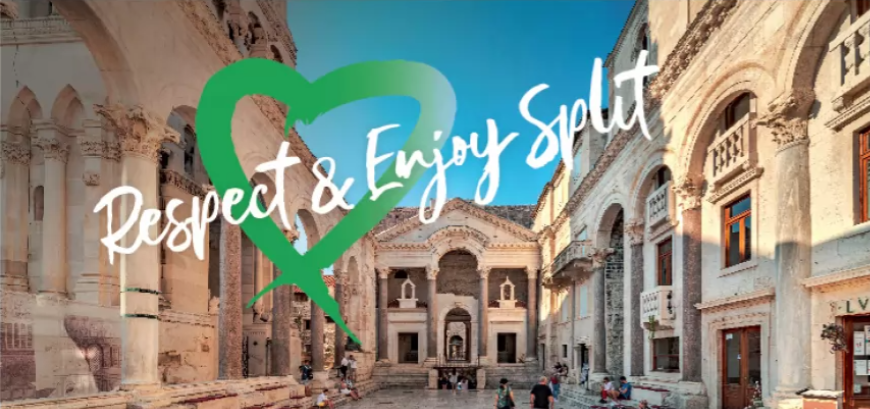
Let me put it in a simple way – the mindset of a young British tourist. Build it and they will come. When you start offering a destination with cheap flights and the cheapest night you will never remember, of course they will come.
Don’t build it and they won’t come. Until the time comes when legislation is possible to limit the pub crawls and booze shops, the problem will not go away completely, but strong deterrents such as fines and effective policing will soon get the message across. There are hundreds of lesser destinations in the sun than Split that would welcome this type of tourism. Split does not need or want it, but the abject failure of the local authorities over the last decade has brought us to where we are today.
Limiting the working hours of bars and restaurants while not touching the rest is very short-sighted and destined to fail. If I could give advice to the Split authorities on the best way to proceed, it would be four words;
Public toilets, effective policing.
There is another aspect of the changes in the palace over the last 20 years – the decline in the local population and the lack of locals visiting the centre, as is it now too touristy and too expensive, as well as the fact that many places close down during the less profitable winter months.
When talking about licences, one of the smartest things I have come across to improve local life happened about 12 years ago in Hvar Town. The big night club Carpe Diem was applying for its licence for the summer until 2am. The mayor gave them two options – 1am licence, or 2am licence if they stayed open all year. They chose the latter for economic reasons, and locals had a wonderful winter option on the riva. That kind of approach, together with a campaign of events to get locals back into the palace, would be an interesting concept to develop. As we showed in our Split Winter Tourism initiative a couple of years ago, there are already local businesses in the palace with ideas and programmes to develop this.
Split tourism is at a crossroads in many ways. Let’s hope those in power make the right decisions.

